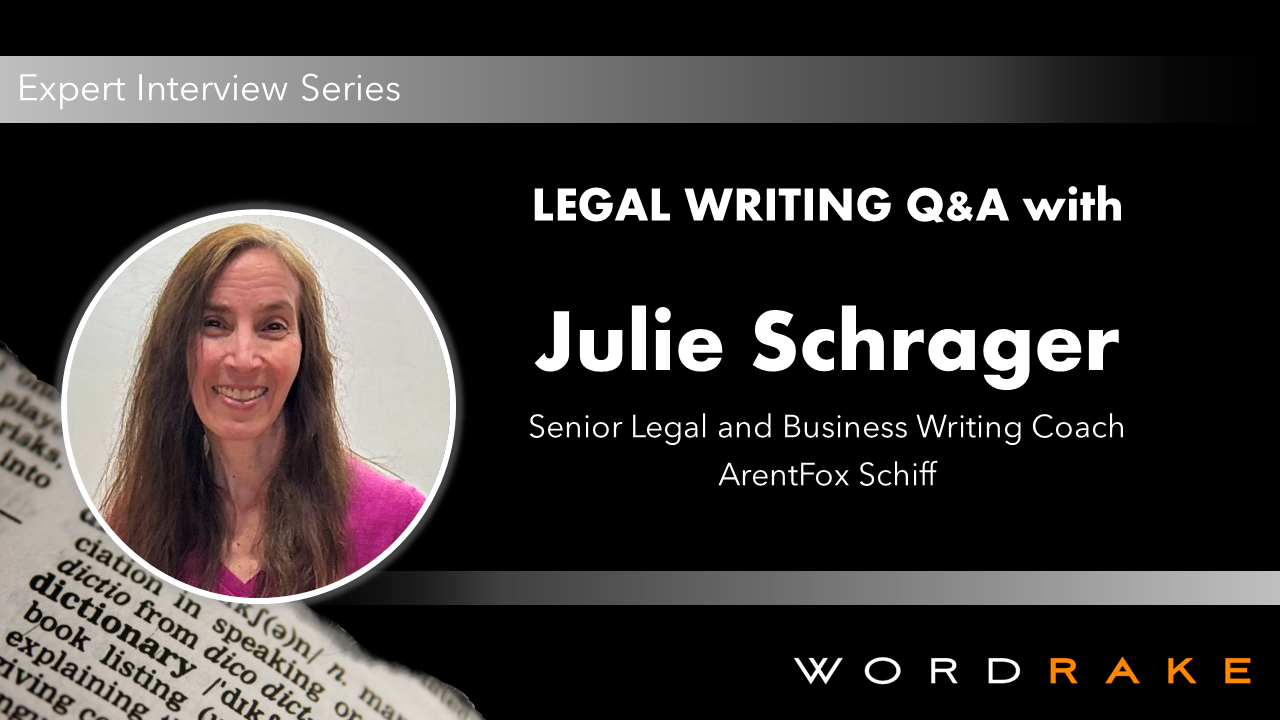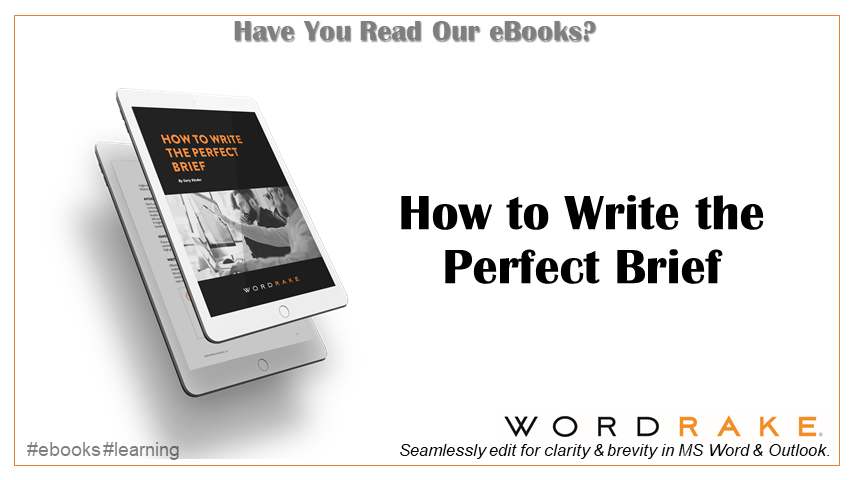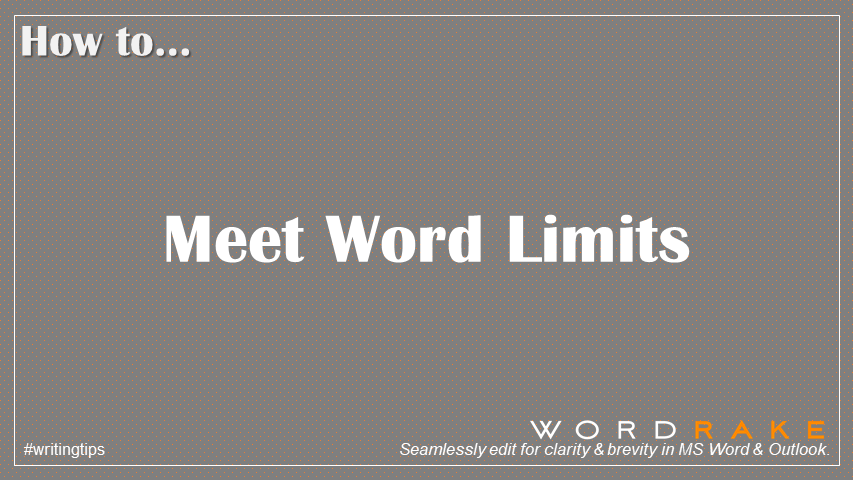Even experienced attorneys and paralegals sometimes need writing help, and if they're lucky, they've got a writing coach like Julie Schrager on staff at their firm to give them the tools they need to succeed. Julie helps legal writers at all levels hone their craft, and she took the time to share some of her tips and experience with us.
What is your role, and how are you involved in legal writing?
I’m ArentFox Schiff’s in-house legal and business writing coach. In my job, I work closely with my fellow attorneys—from summer associates to senior partners—to improve our writing skills. I read and comment on all types of writing, from emails to memos, briefs, and client alerts, and share my thoughts about analysis, structure, content, and style. I also host presentations about a range of writing topics, from drafting effective emails to writing persuasive briefs. One of my favorite parts of the job is helping our newest attorneys adjust to the writing practices of a professional environment.
Why is good writing important to being a good lawyer?
I’m going to answer a different question here: why is effective written communication important to being a good lawyer? The answer is because lawyers communicate in writing extensively—with each other, with clients, with courts, and with opposing counsel. No matter what type of law you practice, you will be writing regularly. For that reason, our writing must be clear and precise and correct and concise. If we are missing any of those elements, we will not be able to advise or persuade our readers. If we can’t do that, we aren’t an effective lawyer.
Is writing something you need to have an innate talent or instinct for, or is it something you can learn to be good at?
I believe strongly that we should all have a growth mindset with respect to writing. We aren’t born good writers, and we don’t need to be. Everyone has the potential to be an effective legal writer. I probably can’t write like Dickens or Hemingway, but that type of creative writing skill isn’t required to be a good legal or business writer. There are concrete tools and skills that we can learn and apply that will make our writing better. We also need practice to improve, and lawyers are fortunate enough to have many opportunities to make their writing better. Try not to avoid writing even if you feel uncomfortable about your skill level. Practice is your friend!
What should legal writers know about working with editors?
First, legal writers should feel grateful if they are working in a collaborative environment where they have the benefit of a trained second (or third) set of eyes on their work. Editors are a gift. They can both 1) improve the specific written work and 2) help you improve your writing going forward. That said, it’s important to welcome feedback on your work and look at it independently and critically, so that you can understand how it adds value. Many lawyers (particularly newer ones) are not in a position where they can push back against an editor’s suggestions, but they certainly should think about the lessons they learn from them.
What is your writing process when you must write to length and deadline?
Let’s be honest here. As legal and business writers, we are always writing to length and deadline! Here are some guidelines: when you receive an assignment, create a timeline for how you will get the writing done. Map out time for drafting an outline or a brief list of your points; filling in the substance under those points; and editing and proofreading the work. My favorite tip for cutting length: copy the document into another one; check out the word count; and set your phone timer for 10 minutes and then cut 10% of the words. When you’re time-restricted, you won’t have time to think too hard before you cut unnecessary words.
What are your top 3 tips for helping legal professionals better plan their writing to meet deadlines?
First, immediately create a timeline when you get a writing assignment. Mark off specific times on your calendar for when you’ll research, outline, draft, and edit your work. Visual reminders are powerful tools and can help you overcome unexpected obstacles. Second, build in the most time for the part of the process that’s most difficult for you. For some writers, that may be outlining; for others, proofreading is the toughest. Third, test your work on someone before sending it to the intended recipient. That might mean sharing it with a trusted colleague or, if no one is available, email it to yourself so that you can put yourself in the shoes of your reader.
Journalists say: “If the story is complicated, ask the simple questions.” Is this true for law? How do you apply it in legal writing?
I think the concept here is that legal writers should take a big step back before diving into a writing assignment and ask themselves about the purpose of the written work, including who is going to read it and what are they going to do with it. It’s very easy to get immersed in details too early and lose sight of the big picture. Understanding the big picture is the most critical part of writing effectively.
How do you add “punch” to legal writing while maintaining a professional tone?
What’s important here is to distinguish between “punch” and language that is offensive or petty or aggressive or that could in any way be perceived by your reader as “over the top.” There are several writing techniques that add punch. Try writing super-short sentences mixed with longer sentences. Use the most effective verb for a situation, rather than one that’s interchangeable with many others. Understand the power of the first sentence of every paragraph and the last one—start and end with important points and bury others in the middle.
Why do you think many legal writing classes do not touch upon tools to aid in writing?
There are several reasons, many valid and perhaps some based on tradition and the feeling of “we learned it this way, and it was difficult, so everyone should learn and experience legal writing in the same way that we did.” Some hesitation derives from the fact that some of the old-fashioned legal writing learning process still has value today—lawyers must learn the building blocks of legal writing analysis and advocacy before we are able to understand finer points. They must learn how to structure a legal argument and why that structure is effective. They also must learn how to translate legal concepts to non-specialist readers. Further, while many tech tools are amazing, no tool is perfect, and we need to be able to judge what we learn.
What is the biggest mistake you see lawyers make when communicating with clients?
The biggest mistake that some lawyers make is not spending the time or hard thinking that it takes to get in their clients’ shoes and understand what the client wants and needs from the attorney. Clients want their lawyers to be part of their teams and to communicate with them in ways that demonstrate that alignment. Clients don’t just want legal answers to questions, and they don’t want to feel like their lawyers are mechanical responders. They want to feel heard and considered by lawyers who understand their business demands.
What do you think law schools get right and wrong about teaching writing?
Law schools get a lot of things right! They are effective at teaching students the fundamental structure of legal writing: starting with a conclusion or point, spelling out the rule, explaining and proving the rule, and applying the rule to the facts. Legal writing classes also teach students how to read and understand all types of law, from statutes and regulations to cases. In addition, many legal writing professors encourage students to think hard about and prepare outlines of their memos and briefs. The gap between law school and law practice comes from the fact that legal writing instructors create the problems and disputes that students address, so students don’t get enough practice answering questions or making arguments for people who don’t already know the answers or the arguments.
Do you think there is a difference between writing for litigation and for transactional purposes? Why or why not?
There are a lot of similarities in the writing that transactional and litigation lawyers do – it all must be clear and precise and concise—and there are also some differences. First off, all lawyers write emails, and all lawyers must be understood by their readers in one read. That requires a high level of attention to clarity. All writing must be clear except in situations where (principally for transactional lawyers), they intentionally want to be opaque. Further, transactional lawyers who draft agreements must write precisely and understand that each word has a specific meaning and therefore each word matters. That’s the same principle that applies to writing for litigation purposes.
Should writing be taught differently to lawyers depending on if they wish to become litigators or corporate lawyers?
All lawyers—both transactional and litigators—write to clients, so everyone all must learn how to write effective emails and memos. It’s great when legal writing classes in law schools include emails and memos in their curricula. It’s also great for schools and firms to offer advanced training targeted to lawyers writing in different areas, including contract and regulation drafting and persuasive writing.
About Julie Schrager
Julie Schrager is ArentFox Schiff’s dedicated in-house legal and business writing coach. In that role, Julie works one-on-one with her attorney colleagues to sharpen their writing skills. Her work has a broad range, and she works with lawyers at all levels of seniority on memos, briefs, emails, reports, and other documents, providing targeted feedback on structure, content, style, and tone.
Julie also conducts writing workshops that address common writing challenges, including how associates can revise, edit, and proofread their own work; how everyone can write more effective emails; and how experienced lawyers can provide effective feedback on writing.
Julie plays a key role in the firm’s diversity recruiting and inclusion efforts and acts as a bridge between law school and law practice, particularly for law students who may be unfamiliar with a Biglaw environment. Julie hosts workshops for diverse law students at law schools around the country. She has presented to upwards of 200 law students at Howard University Law School and Southern University Law Center in the past year and through affinity groups at Notre Dame Law School, the University of Chicago Law School, the University of Michigan Law School, and Fordham University Law School. Julie has also hosted numerous programs for the Diverse Attorney Pipeline Program (DAPP) and The Chicago Committee on Minorities in Large Law Firms.
Julie draws on her background as a former litigator and legal writing professor to provide practical advice for how lawyers — particularly those newest to the profession — can write clearly and purposefully.
About the Legal Writing Series
WordRake founder Gary Kinder created the software to help legal writers edit for brevity and simplicity. In continued dedication to the most effective legal writing, this Series highlights the experience and advice of experts from professors to writing coaches to litigators. Looking to help boost your legal writing skills? Get a free 1-week trial of WordRake here.









